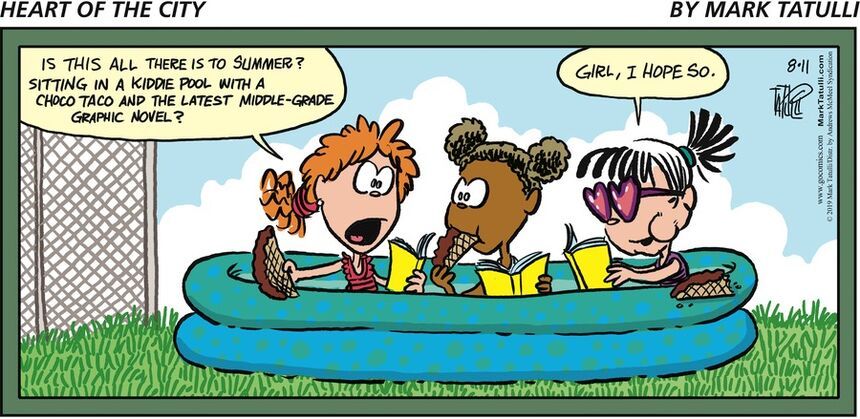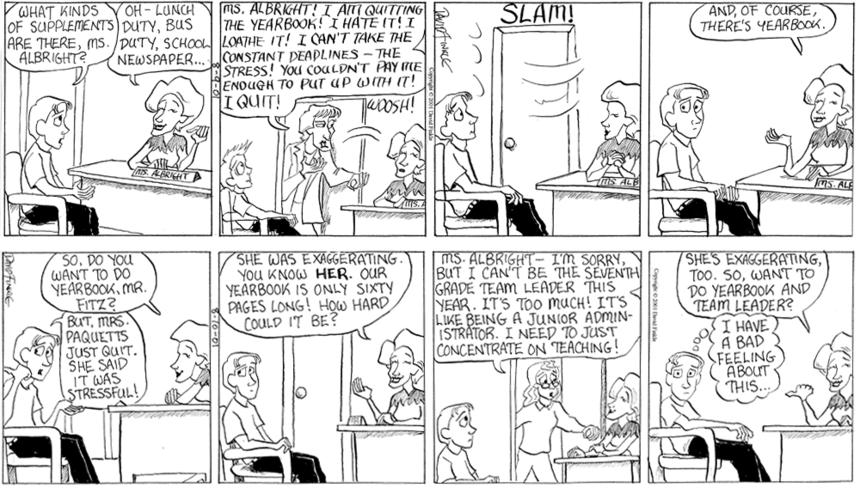CSotD: Sunday Funnies
Skip to commentsEither this was an outstanding day on the comics page or my new policy of reading the funny stuff before I dive into political diatribes and get all hostile and depressed is working.
Possibly both. I did find a couple of good political cartoons, but they’ll wait until tomorrow.
Let’s read some funnies!
And, to start things off, Saturday Morning Breakfast Cereal contains a reproof for political cartoonists who use that half-baked excuse, though, as noted here, it’s also a lame excuse for bloggers and columnists as well.
Pissing off both sides is failure.
When I took fiction-writing courses in college, we had to submit our stories anonymously and then sit there quietly listening as our classmates offered bouquets and brickbats.
“Quietly” as in we weren’t allowed to pipe up and explain what we really meant.
What we really meant belonged in the text and if nobody found it, we hadn’t put it there.
Ditto with cartoons, political and otherwise.
Lalo Alcaraz takes some liberties with the new Dora the Explorer movie, and, after his work on Coco, he has standing.
Though Dora, in the movie, is Peruvian and I’m not sure how many people are walking from Peru to our southern border and clashing with ICE.
It’s not as far-fetched, however, as the person I (pointlessly) got into an argument with on social media, who said that, since China was buying ag products from Brazil, Brazilians would no longer be coming here.
Please. Not only are they not “all the same,” but they don’t even all speak the same language.
As it happens, one of my 14-year-olds did our review of Dora, and pointed out that
One of the film’s biggest achievements is not attempting to whitewash the source material. In fact, they even go a step farther than keeping Dora and her family Latin. Moner was specifically cast for her Peruvian heritage and consulted her grandmother about the proper translations and pronunciations for her lines in the ancient Incan language Quechua. Q’orianka Kilcher, who plays the Incan princess Kawillaka, is a direct descendent of the Quechua-Huachipaeri people of Peru.
as well as noting:
The film also shows a great deal of respect for indigenous tribes and cultures, sending the message that while it’s okay to look for artifacts and archaeological sites for the knowledge that comes with them, it’s not okay to search for them with the intent of looting and destroying the historical sites and items.
Which is in line with what Alcaraz and others did with Coco, and one helluva step up from painting a Danish mermaid brown and pretending that makes her a minority.
And while we’re talking about thoughtful kids and poking around in South America, I’ll let Macanudo lead off this
Juxtaposition of the Day
(Macanudo)
My initial response to Macanudo was that we watched TV all the time and we still had active imaginations. Then I remembered that, when I was a kid, not only was TV off the air between about 1 and 6 a.m., but the kids’ shows were limited to maybe two hours in the morning and two hours after school.
Macanudo cartoonist Liniers is Argentinian and I have no idea how their television stations do things, but I do know he’s younger than my own kids, who grew up immersed in TV but still turned it off and played outside.
I also don’t know whether Argentina has our system of making it financially impossible for most families to make the choice of having one parent stay home until the kids are in school full time. But that’s getting into a political rant and besides, I ranted that yesterday.
Meanwhile, Pearls is right: It’s not a matter of time but a matter of priorities. Granted, the pressures of 21st Century life can leave you pretty wiped out by the end of the day, but that’s why we’ve got spy novels, bodice rippers and other fun stuff.
But Heart and her buddies provide a cheerful, upbeat counterpoint. I’ll grant that my sample of middle-school kids is more than somewhat tilted in favor of literacy, but they race through books and that age group is a solid market not just for graphic novels but for books of all types.
I agree with Macanudo that kids need to get outside and play, and I hope they also stock their imaginations with books, but I don’t think we’re at a crisis point.
Mr. Fitz has been reprinting strips from early in the feature, and here he is a new hire being encouraged to take on additional duties.
It’s funny, but it’s not. I did a story on teacher recruitment years ago, and a superintendent at one of our rural tinies (a dozen kids in each grade level) said he had to put the brakes on new teachers’ willingness to do everything.
The intimacy of their district made it a particular problem, but, he said, even elsewhere, young teachers come in gung-ho and want to coach this team and advise that club and so forth and so on, and the potential for burnout is tremendous.
If young teachers are, as Mr Fitz suggests, being pushed into that trap, it’s yet another case of shooting holes in a leaking boat to let the water out.
I share Greg Cravens’ view of modern potato chips.
My father used to contend that escargot was nothing more than a medium for eating garlic butter, and I think most of these potato chip concoctions are simply a way to shovel salt and artificial flavoring into your mouth.
Placebo chips would work just fine.
Finally, Patrick Chappatte is ostensibly a political cartoonist but this is more a case of commenting on modern life and you needn’t speak German to figure out the gag.
I’d toss in a plug for attending the AAEC/CXC gathering in Columbus next month, but Chappatte and I being on a panel together is not yet confirmed, so it would be irresponsible.
And we wouldn’t want that.








Comments
Comments are closed.